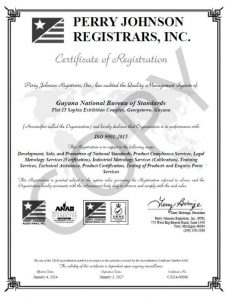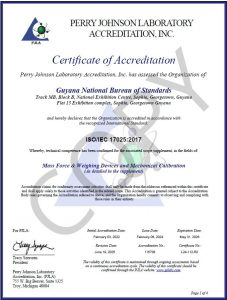The month of October 2020 which is dedicated Agriculture Month in Guyana has concluded and locally across the country, Agricultural Agencies took advantage of the many opportunities to showcase their contributions to the sector. At the international level, the International Organisation for Standardisation (ISO) also sought to make its contribution by educating organisations and businesses within the sector globally on food safety.
ISO believes that it is critical to keep food safe ‘from farm to fork’ by ensuring hygienic practices and traceability at every step of the supply chain. These are essential tasks for the food industry and the ISO 22000 standard offers guidance to our local producers in this regard.
ISO 22000:2018, Food safety management systems – Requirements for any organisation in the food chain, sets out the requirements for a Food Safety Management System. It defines what an organisation must do to demonstrate its ability to control food safety hazards and ensure that food is safe for consumption.
ISO 22000 applies to all organisations in the food and feed industries, regardless of size or sector. Following the same High-Level Structure (HLS) as other ISO Management System Standards, such as ISO 9001 (Quality Management), it is designed in a way that it can be integrated into an organisation’s existing management processes but can also be used alone.
Key potential benefits of using the standard include the ability to consistently provide food-related products and services that are safe and meet regulatory requirements, and improved management of risks in food safety processes. The standard also helps to demonstrate strong links to the United Nations’ Codex Alimentarius, which develops food safety guidelines for governments. It is based on the Codex principles for food hygiene and this enables authorities to refer to ISO 22000 in national requirements and government inspections to ensure that all the criteria for food safety are met.
All ISO standards are reviewed and revised regularly to make sure they remain relevant to the marketplace. Hence, ISO 22000:2018 was revised to encompass the latest trends and food safety requirements and is a timely response to the rising global challenges facing the food industry. It will also help to address the growing need to ensure we can trust current food security systems and that they are sustainable.
ISO 22000:2018 includes improvements to definitions, including those that align with Codex Alimentarius. It also provides a new understanding of the concept of risk, distinguishing between risk at the operational level and the strategic level of a management system.
Certification is not a requirement of ISO 22000 and many organisations benefit from using the standard without seeking certification. If you do opt to have your organisation or company certified, the first step is to find a reputable third-party certifying body as ISO does not perform certification. For further information, contact the Guyana National Bureau of Standards (GNBS), which is the national ISO member.
For further information, kindly contact the GNBS on telephone numbers: 219-0065, 219-0066 or 219-0069, WhatsApp 692-GNBS (4624) or follow us on Faceboon; @gnbsgy






